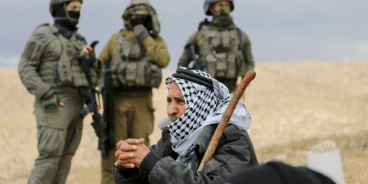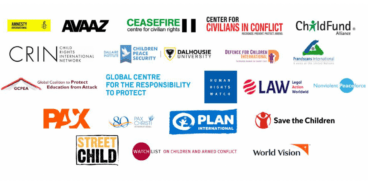
Joint NGO Letter Calling for an Accurate and Complete List of Perpetrators of Violations Against Children in Armed Conflict
Secretary-General António Guterres
United Nations
Room NL-3019
New York, NY 10017
Dear Mr. Secretary-General,
We are writing regarding your annual report on children and armed conflict and its annexes. As a diverse group of nongovernmental organizations (NGOs) working on alleviating humanitarian suffering and protecting human rights, we strongly support the United Nations Security Council Resolution 1612 Monitoring and Reporting Mechanism (MRM). As a key tool for gathering timely, accurate, and credible information on grave violations of children’s rights, the MRM plays a vital role in informing the work of the UN Security Council on children and armed conflict, as well as your annual list of child rights violators. The listing process serves as a foundation for the United Nations to engage with parties to conflict, secure concrete commitments through UN action plans, and create real change for children affected by war.
In order to preserve the integrity of the children and armed conflict agenda, we urge you to publish a complete and accurate list of perpetrators in your upcoming annual report.
Over the past year, we have continued to note with concern the streamlining of mandates, cuts to the budgets of UN peace operations, and the impact of these actions on child protection. These measures continue to diminish the UN’s ability to monitor, report, and respond to grave violations, and thus weaken implementation of the Security Council’s children and armed conflict agenda. Such cuts also seriously undermine your ability to report on an ongoing basis to the UN Security Council and its Working Group on Children and Armed Conflict. With this in mind, in addition to our continued calls for credible, complete, and accurate listing of perpetrators in your annual report’s annexes, we urge you to advocate for the allocation of staff and budgetary resources needed to carry out specialized child protection functions, namely through dedicated Child Protection Advisers, in key UN peace missions. Your 2019 annual report provides a significant opportunity to highlight these concerns to Member States and inform key budgetary decisions.
Furthermore, for the past two years, the annexes of your report have split listings for violations against children into two sections – A and B – to distinguish between those parties to conflict that have and have not put in place measures to improve the protection of children. Your last report stated that parties would be put into the former category where “significant progress was achieved and measures taken” to protect children (A/72/865-S/2018/465, para. 4). We continue to advise against making such distinctions, and instead urge you to identify, unequivocally condemn, and list those parties to conflict that have committed grave violations against children.
In the spirit of Security Council Resolution 1612, listing decisions should be based upon evidence that is documented and verified by the UN. This evidence base provides strong backing for your impartial decision-making. Conversely, the reasons behind your decision to allocate parties to one section of the list or another have lacked clear, transparent criteria; this threatens to undermine the listing process. In a similar vein, we urge you to avoid prematurely delisting parties that continue to violate children’s rights in conflict. Premature delisting undermines the power of the listing mechanism to effect changes in behavior. Further to the 2010 annual report on children and armed conflict (A/64/742-S/2010/181, paras. 178-179), the signing and timely implementation of action plans is the formal and only path for delisting. Indeed, once a party has signed an action plan, regular reporting on its implementation by you or your Special Representative for Children and Armed Conflict can serve to continue to stimulate positive measures to protect children and end violations.
For example, last year the “Coalition to Restore Legitimacy in Yemen” was included in Section B as a party that had put in place measures to improve the protection of children (Annex I, Section B). The Coalition was also delisted altogether for attacks on schools and hospitals (para. 263), despite the fact that your report found that it was responsible for 19 out of 20 UN-verified attacks on schools, and 5 out of 11 UN-verified attacks on hospitals in 2017 (para. 208). Throughout 2018 and into 2019, the Coalition has continued to carry out well-documented attacks on schools and hospitals despite signing a Memorandum of Understanding with the Special Representative on Children and Armed Conflict in 2019, as well as other grave violations against children in Yemen. The Saudi and Emirati-Led Coalition (SELC) should be listed for all relevant violations, and given that these continued unabated in 2018, it should not receive undue praise by being included in Section B. Other perpetrators in the conflict, including the Houthis/Ansar Allah, should continue to be listed appropriately in Section A.
We believe that an evidence-based approach is vital to ensuring that the credibility of the mechanism is upheld and is central to avoiding any sort of politicization of the list, which would inevitably damage its credibility and weaken its impact in protecting children in conflict.
All perpetrators of grave violations need to be held to the same standard regardless of whether they are government security forces, government coalitions, regional forces, non-state armed groups, or even UN peacekeepers. We look forward to the publication of your annual report and reaffirm our call for a complete and accurate list of perpetrators of grave violations against children.
Yours sincerely,
- Action Against Hunger
- Amnesty International
- CARE
- ChildFund Alliance
- Child Rights International Network (CRIN)
- Child Soldiers International
- Defence for Children International (DCI)
- The Global Centre for the Responsibility to Protect (GCR2P)
- Global Justice Center
- Human Rights Watch
- International Bureau for Children’s Rights (IBCR)
- International Service for Human Rights (ISHR)
- Médecins du Monde-France
- Norwegian Refugee Council (NRC)
- Oxfam
- The Roméo Dallaire Child Soldiers Initiative
- Save the Children
- Terres des Hommes International Federation (TdHIF)
- Watchlist on Children and Armed Conflict
- Women’s Refugee Commission
- World Vision International
Cc: Ms. Virginia Gamba, Special Representative to the Secretary-General for Children and Armed Conflict
Ms. Henrietta Fore, Executive Director, UNICEF
Mr. Fabrizio Hochschild Drummond, Assistant Secretary-General for Strategic Coordination

